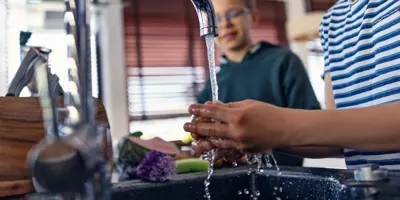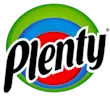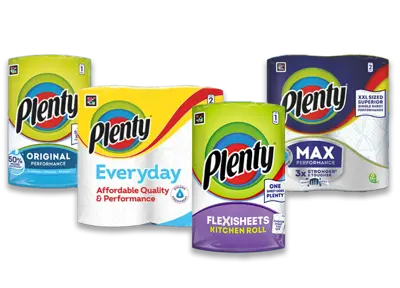2 people found this helpful
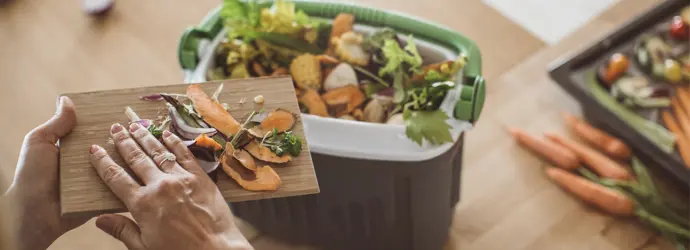
We’ve covered what composting is and how it works, but do you know what to put into compost bins for best results? In this article, that’s exactly what we’ll explore. Additionally, we'll differentiate between industrial composting and at-home composting to provide specific guidance, so you know exactly what to put into your compost bin!
What is industrial composting?
One of the ways you can compost – even without having your own compost bin at home - is by industrial composting. How this works generally differs from place to place, but usually a food bin is provided by your local council for you to keep your organic food waste. This organic waste is then taken to an industrial facility.
These facilities use controlled environments to optimise the composting process. Aside from being much, much bigger than the compost heaps we might have at home, there are a few important differences to what can be composted industrially compared to what you can put in a compost bin at home.
Industrial composting: generally, what can be composted?
- Food waste: This category encompasses a wide range of organic materials, including vegetable and fruit scraps, and leftovers.
- Tea leaves: After brewing your tea, don't toss away the used tea leaves. They are rich in nutrients and contribute to the composting process. However, be careful with the teabags – they can only be composted if the bags are made from natural materials. If they're synthetic or plastic, they can’t go in the compost bin. What could be better than contributing to a healthier garden by having a cuppa?
- Fruit and vegetable peel: The peels from fruits and vegetables can be added to the compost bin - just make sure to remove any stickers or labels (we hope you’d have done this before eating it)!
- Expired or spoiled produce: We’ve all forgotten about that bag of salad at the very back of the fridge... Instead of letting expired or gone-off produce go to waste, add it to the compost bin. This includes fruits, vegetables, and even mouldy bread.
- Stale bread: As well as mouldy bread, don't throw away stale bread. Tear it into smaller pieces and add it to the compost bin.
- Eggshells: Crushed eggshells are a valuable source of calcium and minerals and are great for the soil. What’s more, they break down pretty easily!
- Coffee grounds: Used coffee grounds are just one of those things that feel weird to throw away. Luckily, they’re nitrogen-rich and add beneficial acidity to a compost heap.
If you’re not sure what you can send out for industrial composting, we recommend checking with your local council. Some local authorities might have different systems in place and accept different types of organic waste. So, be sure to check!
At-home composting: what is it?
At-home composting refers to composting done in individual households or small-scale setups. It offers an opportunity to reduce waste and create nutrient-rich soil, but it’s important to know what you can put in a compost bin – and what you can’t! Adding the wrong stuff into your compost bin can disrupt the composting process and we wouldn’t want that!
It’s also important to know the difference between your at-home compost bin and the bio-waste bag in your kitchen. Don’t worry, we’ll explain this later on, too.
At-home composting: what can you compost?
In addition to the items suitable for industrial composting, at-home compost bins can also include a few other items. As well as the items on the industrial composting list, here’s what else to put into your compost bin:
- Garden waste: Add grass clippings, leaves, and dead flowers to your compost bin. These materials add essential carbon and organic matter.
- Shredded paper: Paper waste, such as shredded office paper, can be used as a carbon-rich ingredient in your compost bin. Avoid glossy, coloured paper or newspaper that’s heavily saturated with inks, though.
- Used paper coffee filters: If you use paper coffee filters, they can be composted along with the coffee grounds.
- Used kitchen paper: Plenty Original and MAX kitchen paper sheets are now certified compostable* and can be included in your at-home compost bin, if they are not used with harmful or toxic chemicals.
Tip
Why not check out our handy guide on creating your very own natural cleaning products? That way you can be sure you can compost our kitchen roll sheets when you’ve used them on a compostable mess!
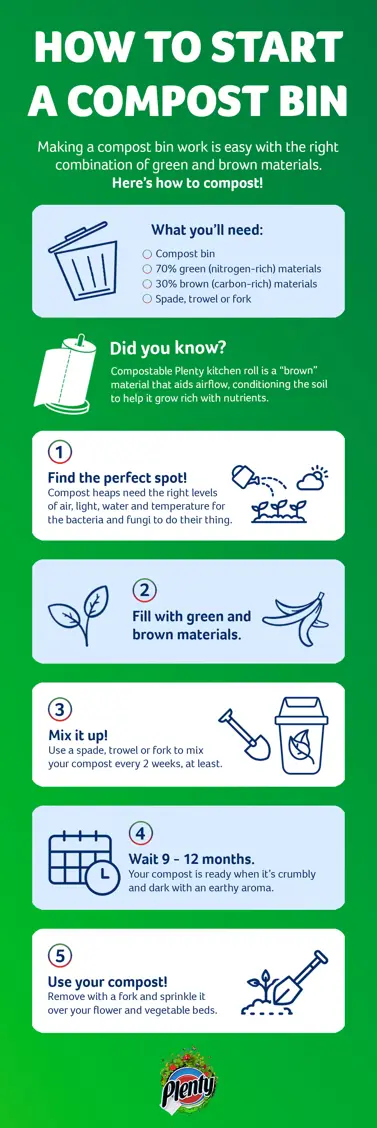
Items to avoid in compost bins
While composting is versatile, there are certain items that should be kept out of compost bins for both industrial and at-home composting. Here's a list of what can’t be composted:
- Liquids, including oil and fat: Excess liquids can disrupt the composting process, leading to unpleasant odours and the potential for anaerobic conditions which harms the process.
- Plastics and packaging of any kind: Non-organic materials like plastics, including bioplastics, do not break down in compost and can contaminate the soil.
- Garden waste exceptions: Some garden waste, such as invasive weeds or plants treated with pesticides, should be avoided to prevent the spread of weeds and protect your compost from harsh chemicals.
- Certain types of food waste: While a good variety of food waste is suitable for composting, food items such as meat, dairy, bones and cooked foods should be excluded to maintain a healthy compost pile.
What about my food waste bin?
We’ve addressed what to put into a compost bin at home, but what about food waste bins? Food waste bins aren’t the same as compost bins and there are a few key differences to what you can add to one.
Do not add these to a food waste bin:
- Liquids, including oil and fat
- Plastics
- Packaging of any kind
- Garden waste
- Anything that isn’t food waste
It’s easy: only food waste in a food waste bin – the clue is in the name!
Tip
Keep getting the idea of compostable vs biodegradable confused? We’ve got an explainer to help you out!
Composting FAQs
1. Can you compost paper products?
For the most part, you can compost paper products. Paper found in newspapers is often fine,1 and you can even buy specifically compostable tissue paper for gift-giving. However, glossy paper such as that found in magazines may contain toxic chemicals and should be avoided.
2. Is kitchen roll compostable if it’s dirty?
Is kitchen roll compostable, even if it’s been used on a mess? Yes, Plenty kitchen roll sheets are compostable if they’re dirty – just make sure it’s not contaminated with things like cooking oil or cleaning fluids that can be toxic for the soil.
Check out our full FAQ page for more information on our very own compostable kitchen roll sheets!
Choosing a compost bin: considerations
For the kitchen, a smaller compost bin is convenient for collecting food scraps. Some local councils may provide these bins for free, so we recommend checking! If you have outdoor space, opt for a larger compost bin made of plastic or wood. This will allow you to have a sufficient supply of compost throughout the year.
Plenty’s top composting tip!
Remember, composting is a continuous process that requires time, patience, and proper maintenance, and knowing what you can put in a compost bin, and what you can’t!
Turning the compost pile regularly, providing adequate aeration, and maintaining the right moisture levels are crucial for efficient decomposition.2 With dedication, while following composting best practices, you can easily divert organic waste from landfills and contribute to a healthy environment! Don’t forget to check out our other composting explainer to get more quick tips on composting!
Composting is rewarding and satisfying and it’s also a great way to teach the little ones about sustainable practices at home. For more tips on how to introduce sustainable practices to kids, have a look at our guide on how to make recycling fun.
So, with key questions answered like ‘what can you compost?’, now you have the know-how to start composting today. Witnessing the transformation of kitchen scraps, garden waste, and other organic materials into nutrient-rich compost that will nourish your plants and help support a sustainable future is super-satisfying! So, get rolling those sleeves up and happy composting!
*Plenty kitchen towels are certified as home and industrially compostable according to NF T 50-800 and EN14995.
Sources:
1 Cornell Waste Management Institute, Cornell Composting, ‘Frequently Asked Questions’
2 The Eden Project, How to make a compost heap: 10 top tips
Related articles
2 easy ways to make homemade musical instruments for kids
Looking for easy ways to have fun with your kids while teaching them how to recycle? Learn how to make musical instruments from waste material.

Why is my cat being sick? Symptoms, causes, and solutions
“Why is my cat sick?” Learn about the signs of illness in cats, the reasons why your feline friend might be sick, and how to treat a sick cat at home.

How to save money at home: simple saving tips and budgeting tips
Looking for simple ways to save money at home? Follow our budgeting tips and saving ideas to help you save money and provide more for your loved ones!

How to speed up composting: 10 hacks to accelerate your compost
Are you looking for ways to speed up your compost? Discover how to accelerate compost with our 10 hacks. Accelerating your compost has never been easier!
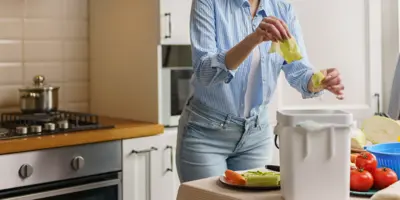
What to do with leftover food: creative ways to use food leftovers
From leftover chicken ideas, to what to do with leftover rice, find out how to get the most from your food leftovers.
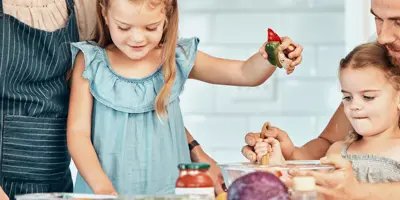
Shortage of water: what is water stress and what can we do about it?
What is water stress, and what can we do to reduce its impact? Learn about water stress, its definition, causes, effects, and how to help water scarcity.
